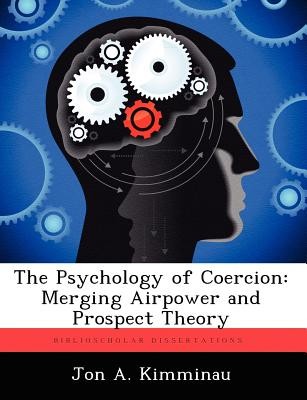
- We will send in 10–14 business days.
- Author: Jon A Kimminau
- Publisher: BiblioScholar
- ISBN-10: 1249594545
- ISBN-13: 9781249594543
- Format: 18.9 x 24.6 x 0.5 cm, minkšti viršeliai
- Language: English
- SAVE -10% with code: EXTRA
Reviews
Description
This paper examines a model for thinking about coercion that explains airpower's role in achieving national objectives. Coercion is the use of power to achieve objectives, not by imposing the desired conditions upon an adversary, but rather by convincing the adversary to accept and implement those conditions as a negotiated solution to a confrontation. The foundation of coercion is the adversary's decisionmaking process, and most theories of coercion rely on a rational model that weighs costs, benefits, and expectations for success. Prospect theory provides a broad and intuitively appealing perspective on coercion, one that demands we consider the alternatives the adversary faces when we ask him to give up a course of action. Additionally, it incorporates the concept of risk, and thereby attempts to account for the variety of risk-taking and conservative behavior we see in conflicts throughout history. The central proposition is that how decisionmakers frame problems guides the decisions they make. A prospect theory model of airpower coercion is developed here that defines framing, decision parameters, alternatives of continuing action or acquiescing to demands, and airpower linkages.
EXTRA 10 % discount with code: EXTRA
The promotion ends in 23d.17:13:04
The discount code is valid when purchasing from 10 €. Discounts do not stack.
- Author: Jon A Kimminau
- Publisher: BiblioScholar
- ISBN-10: 1249594545
- ISBN-13: 9781249594543
- Format: 18.9 x 24.6 x 0.5 cm, minkšti viršeliai
- Language: English English
This paper examines a model for thinking about coercion that explains airpower's role in achieving national objectives. Coercion is the use of power to achieve objectives, not by imposing the desired conditions upon an adversary, but rather by convincing the adversary to accept and implement those conditions as a negotiated solution to a confrontation. The foundation of coercion is the adversary's decisionmaking process, and most theories of coercion rely on a rational model that weighs costs, benefits, and expectations for success. Prospect theory provides a broad and intuitively appealing perspective on coercion, one that demands we consider the alternatives the adversary faces when we ask him to give up a course of action. Additionally, it incorporates the concept of risk, and thereby attempts to account for the variety of risk-taking and conservative behavior we see in conflicts throughout history. The central proposition is that how decisionmakers frame problems guides the decisions they make. A prospect theory model of airpower coercion is developed here that defines framing, decision parameters, alternatives of continuing action or acquiescing to demands, and airpower linkages.


Reviews